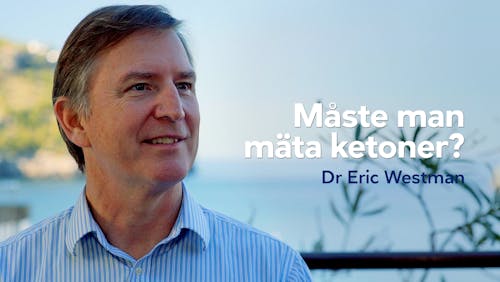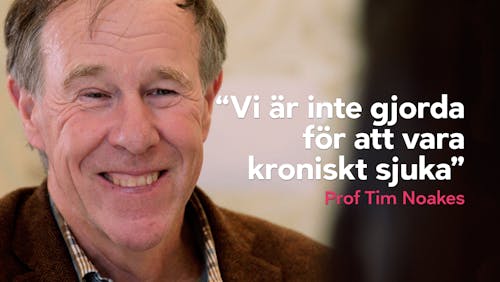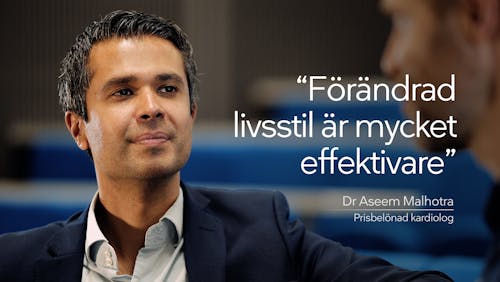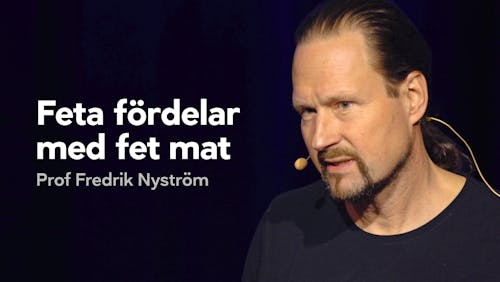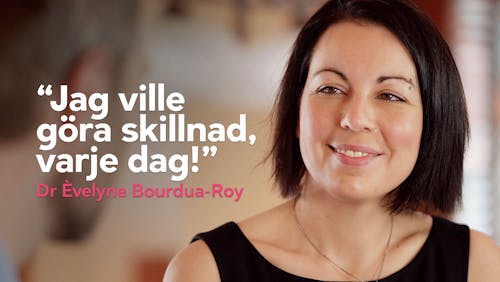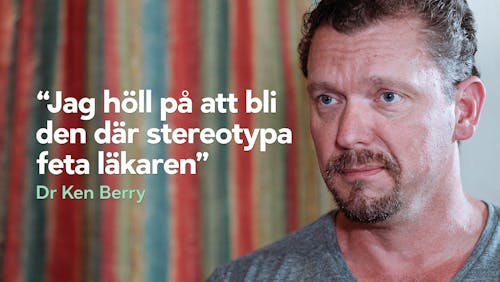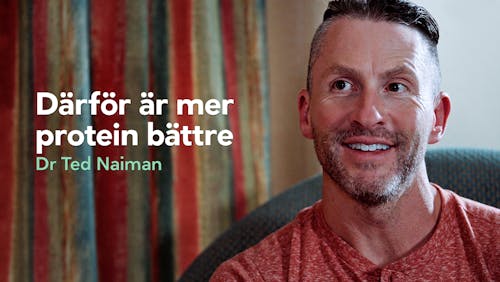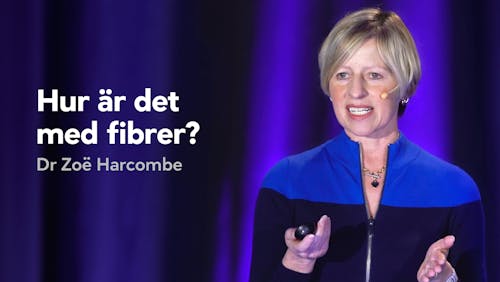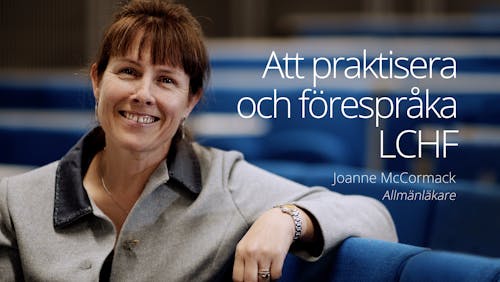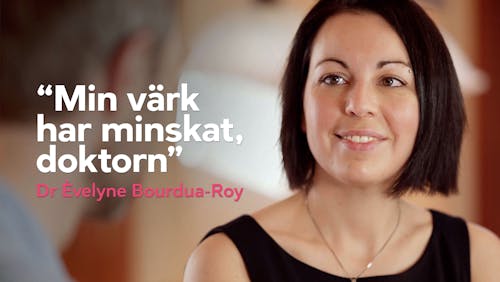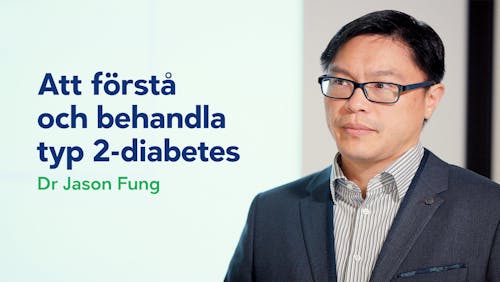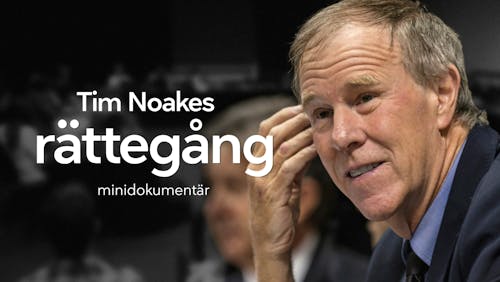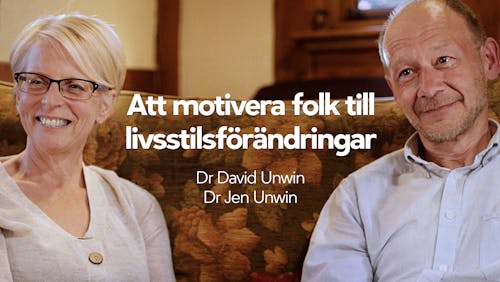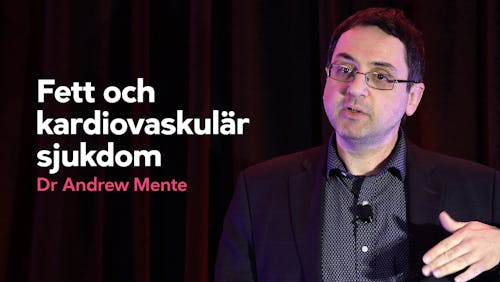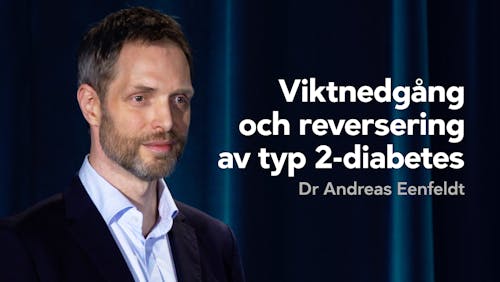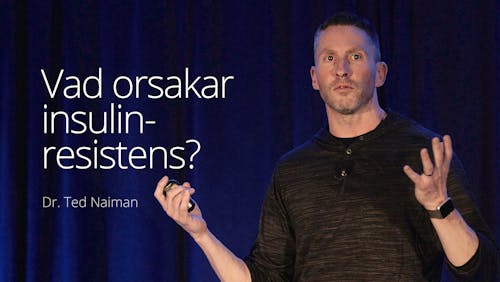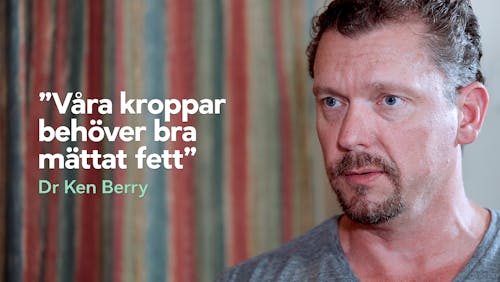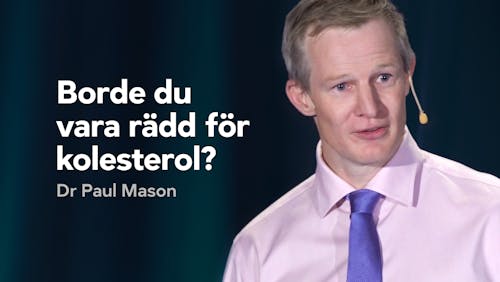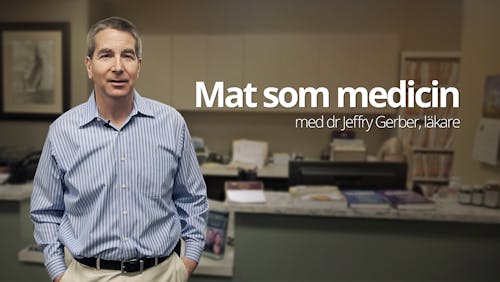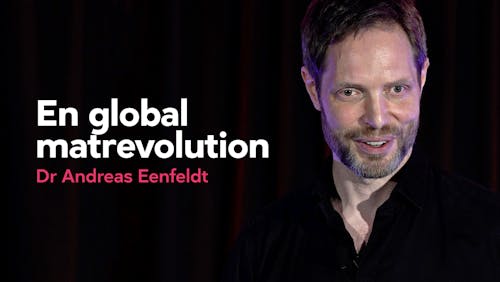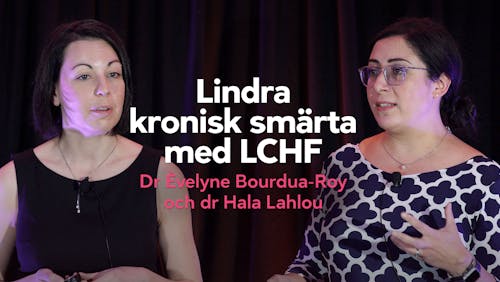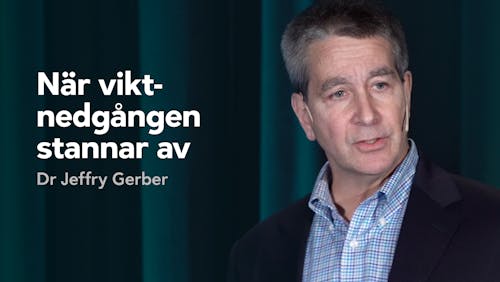Diet Doctor Podcast #2 – Dr Peter Attia om hälsa och långt liv
Vad skulle du göra för förändringar om du fick leva för evigt?
Ok, nu ska vi vara realistiska. Inte för evigt. Men vad sägs om fem år extra? Tio år? Eller hur långt skulle du gå för att säkerställa att hålla dig frisk och full av liv fram till dagen du dör? Det är vetenskapen bakom långlevnad. Den inexakta vetenskapen, ska jag tillägga.
Med ett ursprung som kirurg och forskare inom cancer skulle dr Peter Attia aldrig ha kunnat förutspå att hans professionella karriär skulle leda just hit.
Trots allt, kirurgi är möjligen det ultimata medicinska området när det handlar om omedelbar tillfredsställelse. Betrakta sjukdomen, känn sjukdomen med dina händer och avlägsna sjukdomen.
Långlevnad, å andra sidan, är raka motsatsen till omedelbar tillfredsställelse. Du vet aldrig om du är på rätt spår. Det är i bästa fall kvalificerade gissningar.
Så, vad är det som får en person att gå från kirurgi till forskning om livslängd??
Det är en av många spännande sidor hos dr Peter Attia.
En sak är klar när det handlar om Peter. Vad han än gör kastar han sig helt och hållet in i det. Vare sig det är uthållighetssport eller att finna nycklarna till ett lång liv, vill Peter veta allt och han vill veta det nu. Det är detta förhållningssätt som har hjälpt Peter till en position inom spjutspetsen för forskning och praktik kring långlevnad.
I ett område med hundratals, eller till och med tusentals, obesvarade frågor gör Peter sitt bästa för att besvara dem. Vare sig det handlar om ketogen kost, periodisk fasta, tyngdlyftning, sömn, läkemedel som Metformin och mycket mer, har Peter experimenterat med sig själv och sina patienter på sin jakt efter svar. Hans nya podcast, Peter Attia’s Drive, handlar om hans erfarenheter och lyfter fram några av de starkast lysande fenomen när det handlar om hälsa och välmående. Den har snabbt blivit en av de mest detaljerade och lärorika podcasts som finns.
Som läkare med ett eget och starkt intresse när det gäller långt liv, välkomnar jag Peters filosofi och hans intensiteten när han tar sig an ämnet. I ärlighetens namn, att praktisera långlevnad är svårt! Att försöka få människor att förändra sina vanor för potentiella fördelar årtionden framåt i tiden är ingen lätt uppgift. Vi lever i ett samhälle där vi kräver omedelbar feedback och omedelbara resultat. Att nöja sig med en belöning som ligger långt fram i tiden tycks inte ligga i vår natur.
En del av utmaningen är därför att veta vilka markörer man ska förlita sig på kortsiktigt för att de ska leda till framgång långsiktigt. Testa, testa igen, ändra intervention och sedan testa återigen. Skala av och upprepa. Det är metoden för att undersöka långlevnad. Peters uppdrag är att finslipa vetenskapen för att passa varje enskild patient han träffar.
Mitt eget uppdrag är att hjälpa till att sprida den informationen till den stora massan, så att vi alla kan finna vår egen individuella väg till hälsa och välmående. Och det är därför jag är så tacksam över att ha fått möjligheten att intervjua Peter för Diet Doctors podcast. Jag önskar bara att jag haft några timmar till för att utforska fler ämnen i detalj! Förhoppningsvis kommer det en ny chans i framtiden. Just nu har vi en timmes engagerande och öppen diskussion som utgör det perfekta materialet för avsnitt två av Diet Doctor Podcast.
Varsågoda!
Bret Scher, MD FACC
www.lowcarbcardiologist.com
Lyssna här
Du kan lyssna på avsnitt två via PodBean (enbart ljud) eller på YouTube (ljud och video), båda länkarna finns ovan. Vår podcast är också tillgänglig via Apple Podcasts och andra podcasttjänster. Prenumerera gärna och lämna ett omdöme, det hjälper verkligen till att sprida budskapet.
Och… om du är medlem (första månaden gratis) kan du ta del av kommande avsnitt här redan nu. (Med ditt svenska medlemskap kan du logga in även på vår engelska sida.)
Innehåll
1:25 Välkommen, Peter Attia
1:50 Peters story, från kirurgi till långlevnad
7:08 Peters egen hälsoresa
14:15 Tankar om ketos
19:20 Effekter av att lämna ketos och sluta med ketogen kost
25:30 Biokemi, nutrienter och långlevnad
29:43 Cycling, hur fungerar det och vilka fördelar kan man få?
33:30 Tankar om mTOR och protein
40:45 Vad kan glukos göra?
47:05 Effekter av kortisol
49:37 Individuellt testande
51:08 Hur ser Peters liv ut nu?
55:47 Slutord
Transkription (på engelska)
Dr. Bret Scher: Dr. Bret Scher: Welcome to the DietDoctor podcast. I’m your host Dr. Bret Scher. Today is my pleasure to be joined by Dr. Peter Attia. If you’ve been anywhere in the podcast world or the world of longevity you’ve definitely heard of Peter Attia.
He’s on the forefront and the cutting-edge of longevity and medicine, but his history of how we got to that point is so fascinating and we talk a lot about that and he’s had probably more experience with continuous glucose monitoring and also with ketogenic diets and coming in and out of ketogenic diets and using that with his patients than most doctors out there. Including very nutrition focused doctors and endocrinologists who are treating blood sugar-based diseases.
So he is a wealth of information and we talk a lot about that. I think you’ll appreciate his perspective on it. And as usual we try and cover as many topics as we can to help you take some pearls away that you can learn from and help apply to your life today to help you be healthier and hopefully live longer and live better.
If you want to know more about this podcast or about our site go to DietDoctor.com. You can also learn more about me at lowcarbcardiologist.com. Please don’t forget to subscribe to the podcast and leave a review if you like. It really helps out the podcast and its reach. So thank you again for joining us and here’s my interview with Dr. Peter Attia. Peter Attia, welcome to the DietDoctor podcast. Thanks for joining us today.
Dr. Peter Attia: Pleased to be an early invitee.
Bret: Absolutely. You’re such a big force in the space of not just low-carb but longevity and health in general and on the cutting-edge that it’s great to be able to sit down and talk to you and pick your brain a little bit. I’m sure you get lots of invitations to pick your brains. So thank you for saying yes to this one.
Peter: Sure.
Bret: I’d just like to start by just going through your history and the way you got to where you are today, because I think it’s such an interesting path starting off in school, in mathematics and engineering, eventually going to medical school and a surgical residency and then a cancer surgery fellowship and then McKinsey…
And then actually kind of transitioning and becoming on the forefront of longevity and I’ve got to ask when you’re in the OR, in your residency, in your fellowship, did you ever think your path would play out the way it did.
Peter: No, I don’t think I did. I don’t think anybody really assumes when they’re doing something what they’re going to be doing, you know, 5 years, 10 years later, is so orthogonal from what they’re doing at that point in time. So no, I mean when I was doing those things I was obsessed with those things and couldn’t imagine doing anything else.
Bret: That seems like part of your personality. When you jump into something, you jump in full-board.
Peter: And then presumably when I jump out, I tend to jump out pretty quickly too.
Bret: Okay. What is so interesting though is you went from a field of surgery where you have immediate feedback. There’s a problem, you go in, you cut it out, you’re done… success. you can measure success… To longevity, probably the one field where you can’t ever measure success. At least as some would define it in longevity. How do you wrestle with that knowing whether you’re doing the right thing without being able to measure the outcomes?
Peter: That’s probably the single most important question to think about in longevity which is first you have to acknowledge that everything we do is based on probability. So there’s no such thing as absolute.
So you have to come to terms with that. And then you have to ask yourself the question because too often we ask the question, ”What is the risk of doing X?” or ”What is the risk of doing Y?” when you can’t ever be certain that it will produce the desired outcome. And that is entirely true but what most people fail to ask is ”What is the risk of not doing X?” and ”What is the risk of not doing Y?”
So fortunately my training both in mathematics and then when I was at McKinsey, I was a member of their corporate risk practice, gave me a very good education in risk management and how to think about risk, beyond just the obvious types of risks. And part of that is just this understanding of how lousy we all are at understanding probabilities and risks. So that I could wax-on about that, but I won’t.
So then the next thing you have to do is say, ”Well, given that, we’ll never have option A”. Option A would be… a patient has HIV and their T-cell count is 47 and you want to know what cocktail of drugs is most likely going to return their T-cell count to north of 500. That’s about as close to certainty as you get in medicine.
We have those clinical trials, medicine is excellent at providing answers to those questions and so you can act with near certainty in a situation like that and get an answer. At the other end of the spectrum, as you said with longevity, we’ll never have option A. There will never be a set of clinical trials that can produce unambiguously or as close to unambiguously as you can have in medicine an answer to these questions.
And so that’s why to me it’s imperative that people have a strategy for how they think about longevity that is completely untethered to the tactics. So every challenging problem that one tries to solve has to be solved through, at least in my opinion, a framework that says define the objective, develop the strategy and from there bring forth the tactics. Most people in life, let alone medicine, missed the middle bucket. They sort of say, ”I have my objective; ”I want to live longer, I want to live better, whatever.
What are the tactics? How should I eat? How should I sleep? How should I exercise? What drugs should I take? Is metformin good? Should I be taking meds? What about vitamin D? So they get mixed up in all these tactical questions, which, you know, if you ask any of my patients or anybody who gets subjected to my rants on this topic, I have no interest in those discussions until we’ve established a strategy.
And so the strategy for longevity then I think is the single most important pillar of understanding how to practice longevity. Because as important as that strategy is in say a field like interventional cardiology, where you still have to be thoughtful about how to treat this lesion versus that lesion, versus that symptom, versus this symptom, at least there you can still fall back on clinical data that more closely mirror your outcomes.
But in longevity you are about as far from that as you are ever going to get and therefore most of your efforts should be spent thinking about what is the scientific strategy that forms the scaffolding over which you will lay your tactics.
Bret: It’s a very interesting approach and definitely not your normal doctor approach. And that’s I think where your history of coming from engineering and consulting really played into that, and part of your personality as well I think to develop that. And I’m sure that’s what set you apart from many of the average physicians out there practicing longevity.
And one of the other fascinating aspects of it though is how your own personal experience played into this with your own health. So you know people see you now as the pillar of health and with your exercise routine and your lifestyle, but I guess it wasn’t always that way and I still have this vision in my mind of that picture you posted of your pregnant wife standing next to you with the arrow saying pregnant and an arrow to your belly saying not pregnant, but yet there was still quite a belly there.
And that was despite being a marathon swimmer, exercising hours every day and I got to think that at that point, because you are a doctor, you had been learning all about medicine and being healthy, did you feel sort of let down by the institution or sort of confused as to how you got to that point of being basically prediabetic insulin resistant despite thinking you’re being healthy?
Peter: You know, it’s been a while, so I know the picture you’re talking about, that was taken on the shore of Maui after I had swum the Maui channel and so I know exactly when that was. That was June 2008, so a little over 10 years ago. It’s hard to remember exactly how I felt other than to say I was frustrated.
Now whether I was actually angry at anybody else… I don’t think so. I don’t think I viewed this as I was let down, but I also don’t think that’s my personality. I’m much more likely to be upset at myself and to be upset at some sort of nebulous vague system and… In other words my ego is probably too large to assume that a system has control over me. So maybe it’s like a hyper form of accountability.
Or it’s like the systems is irrelevant… it’s me and I have failed for some reason and I am pissed off that I have failed for some reason. So I think that’s probably more how I felt than feeling like ”Oh, what happened? I put my faith in X and didn’t get Y.”
Bret: That makes a lot of sense especially based on your personality for sure. And then you dove into it to find a solution. And I find it so interesting that the physicians who come to a low-carb lifestyle, like you eventually did, tend to have to get there through personal experiences.
So what was your journey from basically metabolic syndrome extreme athlete to finding a solution with a low-carb lifestyle, low-carb diet, ketogenic diet? What was your journey like there?
Peter: Well, it wasn’t the first experiment by the way. Even in residency I had gone vegan for six months and I don’t remember exactly why I did it, but always these things seemed to trigger after a long swim. So I think this might have been after the first time I had swum Catalina or something like that, but I just decided like it was January 1 and I was going to go January 1 until June 30th.
And it’s funny, you know, people assume that someone like me wouldn’t find great appetitive pleasure on a vegan diet, but I will say I enjoyed it tremendously, I’ve never met a carb I didn’t like. And when all of a sudden you are getting 70% of your calories from carbohydrates it’s quite enjoyable.
Interestingly I don’t feel like I went to hell in a hand basket doing that. I do remember being a little bummed that at the end of that six months I hadn’t lost a pound, I hadn’t gained a pound and there hadn’t really been a meaningful change in my biomarkers though. At that time in my life, it was probably 2005, I didn’t have a fraction of the insight into how to be tracking things.
I was in residency so I would just run down to the ER and have one of my buddies draw a standard panel of blood. So it’s hard for me to comment much on that ”experiment”, but by 2008, 2009… Yeah, 2009 I think it was when things began in earnest. I just came to its sort of through our first principles logical approach, which was by that point I was quite frustrated with where I was and you know, still thinking about it largely through an energy balance paradigm. I said, there’s ”Either I have to eat less or exercise more.”
You know, a very quick look at the arithmetic make it clear I couldn’t exercise more, there weren’t enough hours in the day. Because I was already averaging about 28 hours a week of exercise and working probably 75 to 80 hours a week and had a baby on the way, so none of that seemed appealing. Of course I wasn’t smart enough at the time to realize I could have also introduced another variable which was don’t exercise more, but exercise differently. And I do believe that my exercise today looks very different from my exercise then and I think my exercise today is actually much more logical.
So then the other side of the equation would’ve been, ”You have to just eat less” and that was the advice I was given by the bariatrician I went to see and I just found out to be difficult, because I was like, ”I’m a very disciplined person, I can sort of do anything, ”but I can’t walk around constitutively hungry. That will not work for me.” So I don’t know why I decided to try this first but the very first experiment I decided to try was to just see what happened if I took sugar out of my diet. And by sugar I meant sucrose and high fructose corn syrup.
So that did not mean fructose, that did not mean ”sugar” that is found in many natural foods. It’s just meant if the ingredient label had sucrose or high fructose corn syrup that food was not being consumed. And that was the first phase of my sort of nutritional experiment and that lasted for three months. And I actually don’t remember the details of this, although I’ve chronicled all of this on my blog, but, you know, it’s almost been 10 years now.
But during that three-month period, the results were quite impressive. There was a nontrivial reduction in my triglycerides. Again at the time I wasn’t doing advanced, super advanced testing, but very crude tests. You know, they showed everything was moving in the right direction. But perhaps most to my glee at that point I lost about 10 pounds. And I think that was kind of the victory that I needed to say, ”There is something to this.”
Because I wasn’t hungry not eating all those sugary products. It took a little more work to eat as you can imagine. If you want to make spaghetti and you want to put sauce on it and you can’t have sugar, you have to make your own sauce. You don’t get to go and get anything out of a can other than pure tomatoes or out of a jar certainly.
So there’s little more effort that was involved. And when I wanted a sandwich I couldn’t just use the standard bread, I started to eat this very cardboardy type breads, like the Julian bakery out here… But I was like, ”Yeah, this is fantastic.”
And so that basically turned into about an 18 month journey that eventually led– with continued reductions, until I got to the point where by May 2011 the only thing left to do was try this weird idea that I’ve been reading about called nutritional ketosis. Which at the time there wasn’t much in the way of resources.
Bret: 2011 you said?
Peter: Early 2000. So Phinney and Volek who obviously would be two of the more helpful people in the space for self-practitioners hadn’t published the ”Art and Science of Low-Carbohydrate Living” yet. There was a guy named Lyle McDonald who had written a book a while earlier. It was out-of-print and I don’t know why I just gave up on trying to get it.
I think I was just too lazy. But I eventually just got ahold of Steve Phinney and Jeff and through a lot of personal communication with them they basically guided me through. It turned out in retrospect I was a much harder person to get into ketosis than I have since learned it is for most people.
Bret: Why is that?
Peter: Because I was completely unwilling to back off on my training. So at the time I was training incredibly hard and was incredibly competitive and was really having a difficulty maintaining sort of a positive nitrogen balance, meaning, you know, consuming enough amino acids to not shed muscle, but while simultaneously allowing myself to get into ketosis and going through a very difficult adaptation period.
Bret: So that’s a great point. I mean there is clearly this adaptation point where your body has to get used to being in ketosis where physical activity, athletic performance can definitely suffer. So what are some tips that you can give on how to get past that? How did you get past it? Or did you just have to accept it and back off for a little bit until you did adapt?
Peter: No, I was a stubborn mule. I refused to back off eight weeks into ketosis. My wife begged me to stop because she just couldn’t believe how horrible I looked and how much I basically couldn’t do anything. I mean I would do everything I was trying to do but it would almost kill me.
Like I would pass out every time I stood up, I was just not functioning. And she’s like, ”I don’t understand this. ”You’ve had a year and a half of improving, everything’s been getting better, and now you look like you’re falling off a cliff. And I was like, ”Look, I said I’m doing this for 12 weeks. I’m doing it for 12 weeks, it’s nonnegotiable. And so I think at the time Jeff and Steve were sort of like, ”This is a bit unusual. You’re definitely a hard case. And we’d gone through all the usual–
Bret: Supplementing with electrolytes, and hydrating…
Peter: Yeah, magnesium, bouillon… But we just couldn’t… I mean we’d even tried tweaking the amino acids going down to more… ketogenic amino acids versus gluconeogenic amino acids. And then something just happened at about the 10- week mark where I just hit my grove.
And to this day all these years later, all of those patients I’ve now, you know, guided through this process, I still don’t understand what it took to switch, but when the switch flipped I just felt infinitely better and my performance aerobically came back. It took about a year for my anaerobic performance to come back.
Bret: A full year!
Peter: A full year, but again, I had very high demands. I mean I was asking much more of myself than I do today and asking much more of myself than virtually anybody I know.
Bret: Do you see that pattern with any of your patients now that it takes that sort of 8 to 10 week period before something clicks, or would you say that it’s not something you’ve seen in anybody?
Peter: I would say that’s not the norm. I still think there are times when there are some people that are really hard to get into ketosis. Certainly one tool I used today much more often is fasting as a bridge into ketosis. So I do think that there’s a subset of people who have fatty liver disease, their livers are full of glycogen, full of fat, there is probably some inflammation going on.
So they’re halfway between NAFLD and NASH, if not outright at NASH. Sometimes these people need a little kick in the liver to get going and I can’t think of a better kick in the liver than either a five day fasting mimicking diet, where they’re on about 750 cal a day for five days or just a water only fast for three days as a way to just pop the top off that glycogen reserve, meaning deplete it, you know, get it down by 30%, 40% and then kind of up regulates some of these ketogenic enzymes that allow them to start mobilizing fatty–
Because the problem is some of these patients are walking around with their fasting insulin north of 20. It’s really hard to take that person and get them into ketosis. And I wasn’t that person. You know, I had gone there very gradually.
By the time I entered ketosis I was very insulin sensitive and so that’s a kind of different phenotype from the type of patient that probably is even better served by ketosis, which is someone who is much more insulin resistant or someone who has type 2 diabetes.
Bret: And then you lived for years in ketosis and I’ve read things that you’ve written about how good you felt and how well you were performing. But then eventually made a decision to come out of ketosis. So tell me about that. Why was that decision made and what were your motivators?
Peter: Yes, I spent almost three years in very, very strict nutritional ketosis. I was logging my glucose and BHB levels at least twice a day and I think I just one day decided I’m kind of really itching for more vegetables. That was mostly what I felt like I was missing and obviously you can eat lots of vegetables on a ketogenic diet, but not at the level that I eat.
Bret: What are you talking about? Sweet potatoes and beets and parsnips?
Peter: No, I was literally just talking more carrots, more tomatoes, more broccoli, more of all of these things, things where I knew… Like I love curry… I have this curry stirfry that I make that I’ve been promising people I’m going to post the recipe for it. The only reason I haven’t is I am too lazy, but I promise I will.
But, you know, it’s like… It’s just an overwhelming amount of vegetable matter and I just know anytime I would consume that in ketosis I would wake up the next morning and I’d be at like 0.3 or 0.4 mM. So it would just push me over that edge.
Bret: And with that change how you felt? Did you notice a distinct difference? Because everybody is a little different in what levels they feel.
Peter: My level, my sweet spot was about… a morning fasting level of about 1.5.
Bret: That’s pretty high compared to the average.
Peter: Yeah, yeah probably is. And of course that’s highly dependent on many things. What you’ve eaten the day before, how you slept, cortisol output overnight… I mean a lots of things drive into that. But I think I averaged 1.73 mM, it was my three-year average morning waking up level. So yeah I definitely didn’t feel quite as good at 0.3 or 0.4.
And I mean I think just more broadly, I just got tired of being pretty restrictive in what I did. Also at the time my work was forcing me to travel a lot more and the more I traveled the less control I had over my food environment and the harder it was to basically eat the stuff I was eating, which was sort of the same thing every single day. Which I enjoyed but now those opportunities got harder and harder. So that was sort of what led to the deviation.
Bret: And did you notice right away a change in how you felt, how you thought, your mental acuity, your athletic performance? Was there any transition going back?
Peter: No, certainly not at the level that I could appreciate it on a day-to- day, week to week or month to month level. I would say certainly over a period of a couple of years… I’m definitely not as lean when I’m not on a ketogenic diet. I mean I am easily 10 pounds heavier off a ketogenic diet than I was on a ketogenic diet and at least by DEXA I am probably at least 3% fatter.
So for me a ketogenic diet was a great way to be in the leanest, meanest shape possible, but I’ve had, you know, whole body MRIs on and off the ketogenic diet, it turns out that there was no difference in visceral fat. In other words, the little extra fatness I am today is mostly just a cosmetic fat, it’s not sort of a metabolically deranging fat.
Bret: That’s interesting for you to say, because being so focused on longevity I would think you would want to be the leanest and the lowest body fat that you could obtain in a safe and enjoyable way. So would that make going back into ketosis worth it for you? But I guess what I’m hearing you saying is no because it wasn’t the visceral fat.
Peter: Yeah, exactly, so two things. One, there’s been visceral fat notwithstanding you know, adipose tissue subcutaneous, certainly within modest swings, has really no bearing on longevity or health, or anything of that nature. So it really comes down to probably a bit of sanity, which is, you know… Maybe there’s something good, maybe there’s a humility that’s necessary from getting out of the shower every morning and not wanting to stare at your abs all day. Maybe it’s good to not be quite as vain about that stuff.
Bret: Interesting point.
Peter: Especially if the cost of achieving it is a little more, you know, critical assessment of everything. And then the other thing to keep in mind is at the time my daughter was starting to ask a lot of questions about ”Why daddy? Why do you never eat this? Why do you never eat that? Why is it that every time I have ice cream you won’t have any of it?”
And so I also thought it’s not clear to me whether there could be unintended consequences of my dietary, you know, sort of craziness for lack of a better word is on a soon to be, you know, teenage girl. You know, am I creating something here that is going to come back and bite us one day in the butt? And then my brother and I talked about this a lot, because my brother and I are very similar, and of course he’s equally sort of crazy and he has a couple of girls.
And then we had this discussion, which was, ”Look, it might just come down to how you talk to your kids about it.” So I’d like to think I was thoughtful about that, I always explained to her that the reason I didn’t eat ice cream was because I didn’t feel as smart and I didn’t run as fast and I didn’t swim as fast and I didn’t bike as fast, or lift as much.
Bret: It’s not about image without performance.
Peter: It was never about that. But nevertheless it was just undeniable that dad was kind of a freak. Dad was always eating different. So today I still eat different but it’s just less freaky and my daughter still loves to rub it in my face that she’s eating ice cream and I’m not. But at least now once in a while I’m going to have some.
Bret: So when you’re working with a patient and someone says, ”Will I be healthier and live longer on a ketogenic diet?” How do you approach that? What’s your thought process to help them figure out if that’s the case?
Peter: First is to a knowledge that I have no earthly clue if they will be healthier or live longer on a ketogenic diet. That’s an unknowable… that’s an answer to an unknowable… that’s an unknowable question. So I say, ”Look, let’s stop thinking of these things ”as this is one type of diet, that’s one of the diet. ”Let’s just think of… This is an unsexy way to think about food, but let’s just think of it as a bunch of biochemistry.”
So all you’re basically eating is a bunch of carbon, oxygen, hydrogen, nitrogen, sulfur, a bunch of little cofactors, but that’s all we’re doing. We just take organic matter, that organic matter goes through our system, we metabolize it, it has signaling cascades that come from it, it triggers enzymes, hormones, we assimilate some of it, we discard some of it. So let’s, you know, de-religionize this thing. It’s like this diet versus that diet and that’s my tribe that eats this diet.
I think all of that stuff is sort of hyper dangerous and I will acknowledge that at some point in my life I probably contributed to that sort of bizarre mania. So the real question is… you know, you have lots of things to consider within the realm of nutritional biochemistry and what you eat is part of it, but so is when you eat and when you don’t eat and how you cycle that exposure to nutrient.
So when I think about going back to this strategy of longevity one of the tenets of this strategy is that some cyclical exposure to nutrients appears necessary for longevity. So if you constitutively down regulate nutrients, which is called caloric restriction and you do that in perpetuity, there is some benefit from that, but it seems to be offset by some detriment. So that doesn’t appear to actually be a longevity tactic at least for animals in the wild including humans, given that we are in the wild.
So if we take that off the table then the question becomes, ”How do you get some of the benefits of caloric restriction without some of the costs?” And then there are basically two bifurcating paths. One of them is intermittent restriction to calories and the other is dietary restriction. Dietary restriction says without limiting intake you limit types of nutrients.
So a ketogenic diet then is a simple manifestation of a dietary restriction, either with or without caloric restriction. So there are some applications where a calorie restricted ketogenic diet might be an appropriate tool at least for some period of time, whereas for most people they are consuming an ad libitum ketogenic diet, which is just purely a manifestation of dietary restriction.
And so what I would say to that patient is, ”First state your objective and then tell me what your starting template is.” So then we can understand is a ketogenic diet for you, either cyclically, non-cyclically, with caloric restriction or not, is it the right tool to imprint based on your objective and where you’re starting.
Bret: That makes a lot of sense.
Peter: It’s not a nice answer because nobody wants that. Everybody wants the answer, like give me the bumper sticker. Like yes or no, should I do this? But unfortunately that overly simplistic approach leads to sort of first-order answers and that’s great to first-order problems. But longevity is not a first-order problem.
Bret: So that why you don’t see your answer on the headlines of newspapers and magazines. It’s not quick and in the same time sexy enough to sell but it’s probably the answer everybody needs to hear. And that’s a big disconnect we have in our society right now. That people want a quick answer and it’s not going to always be the right answer that works for them.
But you mentioned cyclical, you mentioned cycling and I think that’s a really interesting topic because a lot of people are using a very low-carb approach to treat a condition, to treat a disease, whether it’s metabolic syndrome or diabetes. And a big question comes, ”How do I know when I am healthy enough to then cycle in and out of ketosis?” What kind of markers or measurements do you use to help guide you with your patients to decide that?
Peter: Well, you know, my patients are actually generally quite healthy, which is not to say everybody in my practice is incredibly healthy, but I might not be the best person to ask that question, because I’m not predominantly starting for a population that has type 2 diabetes or is highly insulin resistant.
But you know that said I have treated many patients on that spectrum and still continue to do so but just on a much smaller level. So the short answer is I don’t know because unfortunately this seems to be the answer to almost any question I’m asked, but you also can realize that these things are empirical and rather than try to know a priority what the answer is, just except that it’s going to be iterative.
So for example someone with type 2 diabetes, if they are responding well to a ketogenic diet, which it seems a surprisingly high number of patients with type 2 diabetes respond very favorably to ketogenic diets, two of the most astonishing cases I’ve ever seen in terms of the success of ketogenic diets have been in patients with type 2 diabetes that had very high hemoglobin A1c’s, both of them north of 10.
And so for those patients, including that one of them was my sister, the thinking was, ”When would you back off this?” When would you start to reintroduce carbohydrates? And of course it depends on what you believe is true. Do you believe there is a reset that occurs? Well, on some level I think there is. On some level whether that occurs and how long in everyone, I have no data, I have no idea.
Bret: And how do you measure it.
Peter: But you would measure it only after the fact so it’s sort of like one of those things where if you can go back to tolerating a modest amount of carbohydrates without the elevation of insulin and/or glucose, then you have your answer, and if you can’t, you have your answer.
But can you know that at a moment in time I don’t know that yet… If anybody’s going to figure something like that out, it would probably be an organization like Virta Health, because they’re going to have the data to look for patterns. You know, presumably I would assume not all of their patients once their T2 D is resolved, they’re going to stay on ketogenic diet, but hopefully they’re going to stay within the program and those data will be tracked. And who knows there might be certain biomarkers that are more predictable or less productive of people who have hit that reset versus those who have not.
And then there might be other conditions in which if we look at the work of Tom Seifert and some of the stuff that Dom D’Agostino has talked about and we talked about this a little bit on my podcast with Dom, maybe someone who’s dealing with advanced cancer or who is in remission, if the case can be made that they’re going to have a better outcome when their, you know, BHB level is higher than their glucose level in absolute terms, then maybe that something is going to be a long-term solution.
Dom defined these things as sort of a pulse and a press, so there are things that are done consecutively and there are things that are done intermittently. So sometimes the dietary role can be part of that press strategy.
Bret: And that’s interesting too, the pulse and the press or the intermittent cycle of nutritional therapies. In one of them, when you talk about nutrient sensors that you’ve been big on is mTOR. And there’s this debate about mTOR and protein especially with a ketogenic diet that if we have too much protein we’re going to stimulate mTOR too much, so we need to limit the protein but then with mTOR being stimulated we’ll need it to grow.
So it seems like there’s this balance, so without drugs, that rapamycin not going on any of that route, how do you handle protein in terms of your beliefs on mTOR and people’s need for proteins for athletic performance, for developing muscles, preventing sarcopenia, but yet not overstimulating those nutrient sensors?
Peter: I think that the most important thing to consider as a macro principle of longevity is the longer you can preserve muscle mass the better. And again I’m saying this within the confines of normal physiology. So I don’t know that it’s entirely healthy to be a bodybuilder who weighs 340 pounds and yet stands, you know, 6 foot one or something like that. At some point perhaps too much muscle mass can be counterproductive to longevity.
But within the confines of normal people like us, one of the absolute goals of longevity should be preserving muscle mass. So sarcopenia is a significant issue and it’s a very nonlinear issue. And those are the ones you have to be very afraid of. Meaning it starts out with a kind of linear loss of muscle mass and maybe even a linear loss of bone density.
But over time it starts to accelerate and so in the last decade of a person’s life that reduction in muscle mass or bone mineral density can become quite problematic. And all of a sudden we see an enormous rise in one particular cause of death which is accidental falls. So that goes from being something it’s virtually unheard of to something that is now in the top 10 causes of death and in aggregate probably reaches about number four or five in top 10 causes of death. So we want to avoid that at all costs.
Well, what’s was the best way to avoid muscle loss? Is maintain muscle as long as possible starting in your youth. So certainly, you know, having mTOR always in a low stage, meaning always in a sort of deactivated state, is not optimal. And again that probably speaks to why constant caloric restriction in the long run probably is a wash if not maybe even harmful.
Because if you’re constantly calorically restricted and/or constantly protein malnourished, you will constantly have a low level of mTOR activity. That’s certainly protective for some things. That is almost assuredly protected from cancer. It’s unclear how protective that would be from neurodegenerative disease or cardiovascular disease, but it’s not necessarily protective when it comes to immune function or when it comes to, as we said, muscle mass.
So if that strategy doesn’t make sense what about the other end of that book? What about always having mTOR on? And if you wanted to turn mTOR on at least as a thought experiment, you would have an IV drip running leucine into you. And leucine of all of the amino acids is the one for which mTOR is the most sensitive. This is now well elucidated.
David Sabatini’s lab… I believe Bobby Saxton was the lead author on that paper in Science probably three years ago in September. They unambiguously identified what the hierarchy was of amino acids that were triggering mTOR. So leucine is the heavyweight champion. And there are companies now that are actually working on developing analogues of leucine that stick around a lot longer.
Because the problem with free amino acids is they’re gone like that. But if you had long-lasting analogues of leucine that would be potentially an amazing treatment for elderly patients with sarcopenia. But going back to the thought experiment, if I spent the rest of my life with a leucine drip entering my system, would that be good or bad for me? I would argue that would be bad for me. I would argue that the benefits to my muscles might be great, but they would be offset by being in a hyper growth state, in particular with respect to cancer, but I suspect also with respect to other diseases.
In fact an interesting question right now is does rapamycin, which you alluded to as a sort of a nonselective mTORC1 inhibitor… If we were now looks including the use of those drugs, would there be any rational use for those in the pulsatile fashion to treat things like early cognitive impairment? Again think this all points back to this notion of cyclical approaches to nutrition and so therefore time restricted feeding certainly offers that or longer fasts that are then followed by periods of feeding. And of course there are so many parameters here, but that’s the general principle.
Bret: So cyclical feeding without a concern of the absolute amount of protein? So talking about sort of the carnivore diet and this movement… What are your concerns with the absolute amount of protein?
Peter: I got to be honest with you. I’ve really only been hearing about this for the past six months and I’ve just put no effort into learning more about it, other than having a number of very interesting conversations with a number of very interesting people who have found seemingly incredible success taking this approach.
Of course one has to be careful because the cheerleaders of these things are often the people you’re hearing the most. You don’t get to see what the graveyard looks like for all the people who tried these things for whom the results were not good. But on first principles a lifetime of a carnivore diet strikes me as not particularly healthy.
Bret: How about using it short-term to help somebody get over a irritable bowel issue, to help somebody improve their insulin resistance? For people who have trouble with plant matter? Because we’re all different in how we digest things… And who still wants to try the keto or low-carb?
Peter: I think that’s the beauty of nutrition. It’s almost without any sort of limitation. And I say almost, there needs to be a very important asterisk there, but almost without limitation. We can tolerate most things as ridiculous as they seem for relatively short periods of time.
And therefore it is I think almost always rather a reasonable approach to take this empirical idea and say, ”Look maybe someone who is having an irritable bowel or someone who does seem to have unusual food sensitivities or unusual symptom X or Y, might benefit from something entirely radical.
Again I’ve spoken to several people and some of them have just told me some of the most convincing stories and coming from who these people are I’m quite inclined to believe what they’re saying. So if it’s not working, the good news is you can stop doing it.
Bret: Right. Now, one of the interesting things for people in the carnivore world, or I guess ketosis in general, is what happens to the A1c. And this is also something that can be quite variable. Now you spent a lot of time with the continuous glucose monitor CGM.
Peter: I’m wearing one right now.
Bret: Very good. Don’t leave home without it. So I mean you are in tune more than anybody to what glucose can do in terms of exercise requirements, nutritional changes, and there are a lot of people… Oh, you’re 78. You’re good.
Peter: Seeing all right, guys? Nice, flat 78.
Bret: So that’s a great example. So a number of people want to get that type of data and they’ll check fasting glucose, they’ll check hemoglobin A1c, and what thing that strikes me is the variability that we’re seeing in people who otherwise seem to be healthy, do not have other markers of diabetes, but are very physically active. And they tend to have higher levels of their glucose.
And there is a small study in Olympic athletes showing that they have higher fasting glucose. So with your exercise history, your history with CGM, what do you make of all that data with higher fasting glucose with higher exercise demands and does that relate to a problem?
Peter: This is a great topic to bring up, Bret. So first of all ever since I’ve been using CGM which is been for three years, my interest in hemoglobin A1c is an absolute number and my interest in fasting glucose has gone from marginal to negative. I mean I think those are categorically two of the dumbest things that we measure and worse yet, make treatment decisions based on.
Bret: Interesting.
Peter: So I’ll use myself as a poster child for someone who’s hemoglobin A1c adds zero value and whose fasting glucose adds maybe marginal value. So I have a condition called beta thalassemia. So I’m a carrier for beta thalassemia. What does that mean? So that means fortunately I don’t have two copies of a gene that would render me screwed.
Meaning I’d be getting blood transfusions every couple of weeks and I probably wouldn’t have a normal life expectancy, but I have one copy of that gene. And the result of that is that I have many more red blood cells than a normal person, about 50% more, but they are much smaller. So if the normal size of red blood cell, the MCV, is typically between 80 and 100, mine is about 50. So I have these tiny, tiny little red blood cells that my buddies in med school used to refer to as ”Shed for blood”.
Bret: That was your nickname?
Peter: One of my nicknames. So ”Shed for blood”. So it turns out I’m not anemic because I compensate for having these tiny, tiny red blood cells by having so many more of them. I never thought a thing about this until I started to dial into all this blood work and then I noticed every time I check my glucose, if I check my glucose five times a day, it’s never as high as the hemoglobin A1c is predicting it is.
So a little bit of digging led to some understanding of the kinetics of hemoglobin A1c. And at the risk of just oversimplifying a little bit, there is an underlying principle obviously that goes into HbA1c, which is the life of the red blood cell. So when a person has a red blood cell that sticks around for longer than the prediction baked into the algorithm, the measured A1c which is always an accurate number leads to an imputed value of glucose that is much higher than is true.
And the reverse is true. If a person has a red blood cell that doesn’t stick around very long, maybe it only sticks around for 60 days instead of 90 days or 110 days, that person is going to have an A1c that measures lower than what their imputed level of glucose is. And so in those patients you’re underestimating, in the former you’re overestimating average glucose. So I’m in the category of the former. So how do I know this? Well, this has now been documented for me in three years, because I have CGM.
The SGMs today are so good… so the Dexcom G6 which I wear now is in a class of its own and I realize I’m going to offend a lot of people, but like the Libre sucks, it’s absolutely horrible. It’s directionally fine, like if you’re trying to make sure you’re not 200 and you’re instead 150, it’s good enough for that.
But for someone like me it’s not sufficient, it’s off by 20%, so it’s not helpful, but even with a device that no longer requires calibration I still check it twice a day, it’s off by 1% to 3%. There are some days when it is 100% accurate on every check. So now I know what my hemoglobin A1c is because I actually know my average glucose. The difference in me, Brett, is one entire percent. Somewhere between 1% and 1.2%.
Bret: So probably like a 4.5% or 4.8% and when you measure it it’s a 4.8 or something.
Peter: I measure between 5.7% and 6% and I’m actually between 4.5% and 4.7%.
Bret: So in the average person who doesn’t have this wealth of data from the CGM, what do you fall back on?
Peter: Well, I look at the OGTT and then we do two types of OGTT. Dr. Bret Scher: The oral glucose tolerance test.
Peter: We always do the standard one with Glucola. So we use 75 g of Glucola, though I think 100 is probably better, but we’ve got our own standard at what 75 g should produce at one hour, two hours fasting time for glucose and insulin. But for a number of patients we also do like real world OGTT tests. So we do an OGTT with rice or bread or in one patient margaritas and cookies.
Bret: That’s a fun one, I’m going to try that one.
Peter: Especially at 8 o’clock on a Monday morning show up with your margaritas and cookies. So that’s one very important piece of data. So if you take a person who is on a reasonably well formulated diet and their one hour postprandial glucose is lower than what their hemoglobin A1c suggests, there’s a problem. In fact those shouldn’t even be close.
So that’s one thing. Now to your other point about fasting glucose, that’s another thing where I have become critically aware of the impact of cortisol on fasting glucose. And again this was something I first gleaned by looking at my CGM data. I would notice that during periods of higher stress, when I was more likely to be ruminating and not sleeping as well, my highest glucose… because you can always take that app I have and I always look at my 24-hour data, my seven-day data, my 14-day and my 21-day trailing…
So I’m spitting out one of those reports every single day. So every minute of every day I’m knowing that and I know what you’re thinking… ”You weren’t willing to stay on a ketogenic diet for life, but you’re willing to do that” and the answer is yes, I like data more.
Bret: Everybody has their limits, I can see that.
Peter: But what I noticed was my highest glucoses were while I was sleeping. So I could finish dinner at 85, go to sleep at 88 and wake up at 110.
Bret: And why do you think that is?
Peter: Cortisol. Yeah, so then how do you measure that? So you can collect urine overnight, the bladder is a lovely reservoir, because unless you pee your bed, which luckily I don’t do that–
Bret: Getting a little personal here.
Peter: Just want people to know, I’m continent. You know, when you wake up in the morning you’ve got all of the cortisol you produced at night. So you can actually quantify how much cortisol you’re making and of course you have to be sure you’re measuring free cortisol, cortisone, and then the metabolites of each of them so things called…
We won’t get into the tetrahydrocortisols and tetrahydrocortisones, but basically you can figure out how much cortisol has been floating through your system overnight. And the correlation between how much cortisol is there and how high that glucose is, is very strong. And of course it’s mechanistically understandable. Cortisol is increasing hepatic glucose output and it’s driving it up. And you can also tweak the system by taking metformin and not taking metformin, because Metformin is suppressing hepatic glucose output.
So using sort of physiology, CGM, other tests, drugs, you start to put this picture together. And just today I was talking to a patient and she was a little concerned because her fasting glucose was 100. And I was able to reassure her that that is absolutely zero consequence. Now, where the hemoglobin A1c does probably provide some value is on a relative basis or on a per change basis within a given patient provided you can convince yourself that there hasn’t been a material change in the life of the red blood cell.
So if those things are all true and a patient goes from 5.9% to 5.5%, then they are likely to have experienced whatever that reduction is. In other words is not that they’re absolute one from here to here, I have no faith in that, but have faith in that Delta, the magnitude of the Delta.
Bret: I like your reliance on the glucose tolerance test, especially a real world glucose tolerance test. And that’s something I wish we did more of but it’s hard to standardize and medicine loves standardization rather than individualization. I binge since seeing the average person walked into the doctor’s office and said, ”I want to do a chocolate chip cookie and a Margarita glucose tolerance test” and what kind of reception that they would get.
Peter: Yeah, unfortunately, I mean hopefully the day will come when I don’t think we’ll ever have point-of-care insulin testing unless there’s a huge breakthrough in how the assay works. But hopefully it will be much easier for someone to test their own glucose and insulin levels and then they won’t need their doctors to, you know, stand in the way and obstruct them and they can just do a test on their own.
Bret: Yeah so since you mentioned that, are you using fasting insulins or one hour postprandial insulin or the Kraft test? Is it something that you use as well?
Peter: Yeah I’m a Kraftonian, a Kraft disciple. I don’t do it to the level that Joseph does it, of course, I don’t do a five-hour, not because I don’t think the data is valuable but–
Dr. Bret Scher: You got to stick around for five hours.
Peter: But I absolutely consider the one-hour postprandial insulin to be one
of the most important numbers I can get from a patient. Dr. Bret Scher: More important than the fasting?
Peter: No, both are important but you’re generally going to see the harbinger, the canary in the coal mine seems to be that one hour.
Bret: That makes sense.
Peter: And when I see the perturbation in the one-hour insulin, it usually
precedes what I see in the fasting insulin.
Bret: All right, very good… So give us an idea of what the life of Peter Attia looks like now in terms of your thoughts on your own nutrition, your own exercise which you alluded to that no longer doing the long-distance endurance exercise, but sort of exercising smarter, more efficiently.
So give us an idea of just maybe two or three pillars that you function, that you live by in your life that we can sort of take away with us and say, ”Maybe this is something I should apply to my life”.
Peter: Okay, but if that’s the caveat, I’m not telling.
Bret: Okay, I take that last caveat away. We’ll stick to Peter Attia.
Peter: Nobody should be doing what I’m doing because unless one can demonstrate that they’re similar to me in some way, in terms of where they are, what they want and what their appetite for risk is. I think it would be unwise to mimic anything I’m doing.
Bret: I’d like to say that I said that on purpose, just to–
Peter: Just to give me my chance to get my soapbox, yeah. So I am hugely a proponent of cycling the way I do things. So right now I’m doing an experiment that feels pretty good, which is every quarter I’ll do the following: I’ll go on a ketogenic diet for a week… And going back on a ketogenic diet has been very fun and enjoyable when you’re doing it for relatively short period of time and then do a water only fast for some period of time, still working out the kinks on that, but somewhere between 5 and 7 days.
So now you’re shutting off mTOR, you’re in negative nitrogen balance, you are clearly losing muscle, come back to a ketogenic diet… So it’s a KFK, right? Keto for a week, fast for a week, keto for a week… And then 10 weeks of time restricted feeding. And that’s 13 weeks, is exactly one quarter, repeat that four times a year. And then the time restricted feeding, I’m very particular about how I do that.
So on Monday, Wednesday, Friday, when I’m lifting weights, the window is not that big. It’s about a 14 window fast, 10 hour non-fast, so that I’m getting the nutrients as close to the catabolic activity as possible on Tuesday, Thursday, Saturday, Sunday, which is my riding days, I am extending the window to 18 to 20 hours of fasting on the time restricted feeding.
Bret: So what about on your water fast days and your exercise, have you found your ability to perform on those days at a high level?
Peter: Oh, when you’re just on a water only fast I think you’d generally have to recalibrate things a little bit. I have found that for any fast longer than two days, my aerobic capacity actually goes down which is counterintuitive, but my leg speed seems to really fall apart. So for example I spend a lot of time riding you know a Peloton or a Wahoo Kickr, like a stationary bike.
It’s generally… I don’t even have to think to be between 90 and 95 RPM on a bike. That is sort of where anything slower than that feels like I don’t know what I’m doing. So when I’m in that fasted state for more than 48 hours, it’s almost impossible for me to turn my legs over more than 80 times per minute. A huge reduction in cadence. Also for reasons I don’t understand, walking feels very difficult to me.
Bret: Just walking?
Peter: Just walking. And walking upstairs and just dragging my sorry self around. It feels hard. Conversely being in the weight room, I seem to experience no deficiency in strength. I feel just as strong or weak depending on how you look at it as I normally am, but I need much longer to recover between big movements.
So if I am squatting, or deadlifting or rowing I need more time and my heart rate goes much higher. And again all of that could be explained by dehydration. Though if anything I feel a little over hydrated when I’m fasting, because I feel like I’m drinking even more than I need to, given that I basically seem to live in the bathroom and peeing constantly.
Bret: I’m sure the mechanism of why that happened would be another fascinating rabbit hole we could jump down, but I do want to be respectful of your time because we are sort of near the end. And I take this opportunity again to thank you for coming on the podcast here and also to congratulate you on your own podcast. I mean ”The Drive” with Peter Attia has quickly become one of my favorites that I have to listen on a regular basis.
The depth of the information you cover is phenomenal, so we scratch the surface on a lot of things here. So I would certainly say if people are interested in hearing more, they should definitely listen to your podcast. But what else do you want to leave our listeners with and other places to direct them?
Peter: Well I don’t know, first of all, thank you for that and thank you for having me on the show. I think our podcast as you said it’s… at this point at least I’m not willing to make any apologies for how technical it is, though I know that there’s going to be a subset of people who think, ”Gosh, why can’t this podcast just be 30 minutes of sort of elevator music?”
But I have a great team of analysts and they… in particular Bob and Travis, who work on this full time, …they just put an almost upsetting amount of work into the show notes. And so if anybody is listening to the podcast and thinking, ”Gosh, I wish I had more of a way to understand this”, the show notes should always be consumed with the podcast, because you’ll get a lot more out of them and you’ll certainly be able to track down the references and look at the timestamps and all that sort of stuff.
Bret: All right, and if they want to read more about your blogs and the things you’ve written in the past where can they go?
Peter: I think it all lives at peterattiamd.com.
Bret: Peter, thank you again. It’s been a pleasure.
Peter: Yeah, my pleasure. Thanks, Bret.
Om videon
Inspelad vid konferensen Low Carb San Diego i juli 2018, publicerad i september 2018.
Värd: Bret Scher.
Kamera: Giorgos Chloros, Jonatan Victor and Simon Victor.
Ljud: Jonatan Victor.
Klippning: Simon Victor.
Missa inte
- ENDAST MEDLEMMAR
![Måste man mäta ketoner?]()
- ENDAST MEDLEMMAR
!["Vi är inte gjorda för att vara kroniskt sjuka"]()
- ENDAST MEDLEMMAR
![Feta fördelar med fet mat]()
- ENDAST MEDLEMMAR
!["Jag ville göra skillnad, varje dag"]()
- ENDAST MEDLEMMAR
![Intervju med dr Ken Berry]()
- ENDAST MEDLEMMAR
![Hur är det med fibrer?]()
- ENDAST MEDLEMMAR
![Att praktisera och förespråka LCHF]()
- ENDAST MEDLEMMAR
!["Min värk har minskat, doktorn"]()
- ENDAST MEDLEMMAR
![Att förstå och behandla typ-2 diabetes]()
- ENDAST MEDLEMMAR
![Tim Noakes rättegång]()
- ENDAST MEDLEMMAR
![Fett och kardiovaskulär sjukdom]()
- ENDAST MEDLEMMAR
![Våra kroppar behöver bra mättat fett]()
- ENDAST MEDLEMMAR
![En global matrevolution]()
- ENDAST MEDLEMMAR
![Lindra kronisk smärta med LCHF]()
- ENDAST MEDLEMMAR
![Women's questions – kan fasta vara problematiskt för kvinnor?]()
